How to study the Bible for beginners - tips & ideas for beginners and experienced Christians. We are not taught in church how to read the Bible, but studying the Bible is an essential activity of Christianity. It is easy to learn to study the Bible with these 10 practical tips.

I received an email last week from a sweet mom of five (5!) boys. She is a new believer, and she is trying to find ways to fit her walk with Jesus around her already busy life.
I responded to that email and told Amanda that I understood a little of her dilemma (although not all of it because I have only 2 rowdy girls and that is not even close to 5 rowdy boys), and hopefully I could help her to figure it out.
I remember being a new believer. I was introduced to the Bible as a child, but I never read or studied any of it until I came back to the church as an adult. It was not all that long ago that I opened at The Word, knowing I was supposed to read and study it, but not having a clue what read and study really meant.
I was intimidated by the Bible and, if I'm being totally honest, completely overwhelmed by it. I had a King James Bible, and it didn't make any sense to me at all!
If you are there, my friend, read on. Even if you have been a believer for years and years, if you don't have a strong Bible study habit, this post is for you, too.
13 Tips for Studying the Bible For Beginners or Experienced Believers
- Get the right Bible translation. I have only ever met one person who preferred the King James Bible over all others. It is hard to read and most of it doesn't make sense to modern English speakers. Let's just get that right out in the open. Most churches that I've been to use the NIV, and that is a sound and solid translation that is well respected. I've heard that the ESV is considered the most accurate translation according to the ancient languages, but I personally prefer the NLT. Some people really like The Message. The NLT and The Message are paraphrased translations which mean they weren't translated word for word which makes them both slightly less accurate but also worlds more readable. The ICB (International Children's Bible) translation is another paraphrased translation that removes some of the wordiness of the text and uses clear, concrete language intended for children but helpful for adults too.
You can go to Bible.com to read many different translations of the same verse or verses and get a feel for which you prefer. My point in telling you all this is that there are dozens of translations, and they vary widely, but they are ALL good and valid ways to read and study the Bible. - Get the right Bible. I personally really like this illustrated NLT study Bible, but I've also included an assortment of Bibles that I have and recommend at the bottom of this post. (Full disclosure: I may have a problem with buying Bibles. A girl can never have too many, right?) Choose a translation that you like, one that makes sense to you, and buy a paper Bible in that translation.
I am a digital girl for most things, but I like to read the Bible in paper. Somehow, it makes more sense to me when I can read, highlight, and write in the margins. I like to be able to put dates next to the verses that I've studied so that the next time I am led to those same passages, I can look back and remember what I learned the last time. - Don't be afraid to write in your Bible. I've dabbled in Bible journaling over the years, and that involves coloring in the Bible and sometimes over top of the text. (I have a special Bible just for that and don't do it in my normal study Bible.) But even if you don't go that far, writing notes and dates in your Bible is important for consistent Bible study. Another important act is highlighting or underlining in your Bible. (Here's a good Bible highlighter that won't bleed through the pages.) You need a way to mark passages that were important to you. After reading The Circle Maker, I also started circling God's promises in my Bible and writing the dates on which I noticed them.
- Start small. The first time I ever really read the Bible, I signed up for a Bible in 90 Days challenge. I'm not even kidding. I jumped in with both feet and read the Bible for 2 hours a day at first, and then I petered out somewhere around First or Second Chronicles. I'm amazed that I got as far as I did for as much work as it was. Don't be like me. Start with a goal to read the Bible one chapter a day or for 10 minutes a day. Once that becomes a habit, you can always up your game if you're able or rest comfortably knowing you're doing what you can. But if you start with an overly ambitious goal and don't hit it a few times, you more than likely will give up.
- Schedule Bible study. What you plan to do, you do. What you wish you'll do, you never get around to doing. Have you ever noticed that? Schedule a time to do your Bible reading and studying, and then anchor that time to something you already do. For me, I read and study the Bible after I write in my journal. I do both of these things right before I start work in the morning, at my desk in my home office. I like starting my day with the Bible, but when I was a teacher, I often ended my day with the Bible. It doesn't matter when you do it, only that you do it. The anchoring step is important here. It's hard to get your brain to establish a new habit without an anchor. The anchor is like a trigger that reminds your conscious brain that it's supposed to do something. So perhaps your anchor could be that you study the Bible right after breakfast or after lunch or right before you shower or whatever. Just choose something that you always do and make a point to always study the Bible along with that other thing.
- Get your stuff together. This is a big beginner mistake. Whenever you've decided to do your Bible study, you likely will not do it unless all your materials are in the same place at the same time. So get it all together and put it in the place where you'll study. Make sure you have your Bible, a pen or pencil, your devotional or Kindle, and anything else you think you might need, all sitting in your spot, ready to go.
- Pray before studying. In my Bible study, A Grateful Heart, I have listed out a prayer every day before the study begins. I pray this same prayer every single time I sit down to study the Bible, and you are welcome to use it too. I wrote it some years ago, and it makes sense to me. I ask God to join me in the study and to open my heart and my eyes to the message He has for me. It is a small thing, but I think it makes a difference.
There's also a really nice prayer in Jen Hatmaker's book called A Modern Girl's Guide to Bible Study. I wrote it in the beginning of my journaling Bible, but it is a lot longer and I often forget about it. So I just pray the prayer above which I have memorized. - Avoid rules. Christianity is not about rules, no matter what some people say. Being a Christian, a follower of Jesus Christ, is about having a personal relationship with Him. Yes, He calls us to read and study His Word. That is true. But He does not say "Thou shalt read 3 chapters of the Bible per day." Doesn't that sound ridiculous? I said above that you should start small, and I totally mean that. If you can only manage to read one verse a day, then read one verse. It was one more verse than you read yesterday, right? It counts.
In A Grateful Heart (sample page pictured above), I suggest a passage to read, always a chapter or less, and a verse or two to write. I'll get to writing more below, so hold on to that, but the reading is always relatively short. I think that's important. We are busy people, and we don't have time to sit and read our Bibles for 30 or 40 minutes a day. It would be nice if we did, but we don't. We can manage whatever we can manage, and that is good enough. Don't let yourself get trapped in what you should have done so that you fail to do what you could have done. - Write scripture. As a former high school teacher with a Master's degree in education, I can tell you all about the research showing that handwriting helps you to retain information infinitely more than reading it alone, but the research would probably be boring as heck. Instead, let's leave it at that. Writing matters. Make it a habit to handwrite whatever verse or verses you choose to focus on each day. (Not necessarily the entire passage you read, but just a verse or two that stuck out to you and felt significant.) Keep a journal for this purpose because that will help you to look back and see what you were thinking about at different times. It will be a record of your walk with The Lord.
- Consider a daily devotional. A devotional is a collection of short, Bible-focused passages that you can read to get a bite-sized piece of the Bible to think about as you go through your day. Most of the time, they include a scripture reference and short (a paragraph up to a couple of pages) reading and then a prayer. You can use A Grateful Heart as a daily devotional for the two weeks of the study, and I highly recommend that. The daily lessons tie back to the reading passages and give you a place to springboard into your own study. After you've finished A Grateful Heart, you may like to move on to Jesus Calling or Jesus Always, two of my favorites. I read both every day to see which resonates and spurs me on to further study, and they both minister to my heart in different ways. If you'd like more suggestions for great devotionals, I have included a bunch that I've personally used in my Amazon shop.
So now that you've got a Bible and a devotional, and you're all set to go. What's next?
Or, you've finished A Grateful Heart. What's next?
A big mistake that beginners often make is to just open the Bible to a random page and put their fingers down on a random verse and start reading. They don't know what else to do. (Please tell me I'm not the only person who tried that aimless method at least once before.) But that is not a good method.
What follows are three additional methods to choose a passage that you can use to read and learn scripture.
- Choose a theme. I have published more than a dozen topical Bible verses lists on everything from disappointment to anger to loneliness to joy to miracles to grace. If you poke around in the Bible study section of the blog, you will find them. Another great resource for these topical lists is my Printables Vault where you can find every Bible study printable I've ever published, including all the topical lists and A Grateful Heart. (They are all included in one price for the vault.) Wherever you choose to get your list of verses, the key to studying thematically is to choose one verse per day, starting at the top. Look up the verse and read the verses before and after it to get a solid idea of what the whole passage is saying. What message does God have for you in these words? Write the verse or verses that are meaningful to you in your journal, on paper with a nice pen. Pray over them and ask God to open your eyes to His message. Write the date in the margin and try one of the Bible study methods here to explore the verse or passage.
- Choose a book. I love the book of Philippians and also the Gospels (Matthew, Mark, Luke, and John). They are easy books to read, especially for beginners, and they pack a powerful punch. Nearly every verse in each is important and personally meaningful. All five are in the New Testament which is the part of the Bible about Jesus, and the Gospels are the books about his life from birth to death and beyond. The New Testament (for the most part) is much easier to read than the Old Testament, and I have always enjoyed it more (except for Genesis which is my favorite book). Start in the New Testament and select a book to read. If you're using a study Bible, it will have resources at the beginning of each chapter that will help you to understand who wrote the chapter, when, and why. Then you can move on to actually reading the verses a little at a time.
- Start at the beginning. At one point, I purchased a chronological study Bible and intended to read through the Bible from the beginning to the end in chronological order. (The Bible is not written in chrono order so this involves a fair amount of shaking things up.) I got about a third into it and petered out in my daily commitment (about as far as I did that time of the Bible in 90 Days), but I picked it up not long ago and restarted. Starting at the beginning is nice in a way because you start out with a bang: Genesis is one of the most interesting and action-packed books of the entire Bible. But then you move into the laws of Moses and all the sacrifices and whatnot of Leviticus, and all that can be hard to plow through. If you decide to start at the beginning and find your mind wandering and commitment waning as you get through those laws and procedures and sacrifices, feel free to change it up and read something else. Remember, there are no rules, right? This is probably my least favorite way to study the Bible, just because of those chapters near the beginning that are so hard for me.
And now that you've chosen a passage to study, there are many different ways to actually study the text. Here's a post explaining 13 different Bible study methods you can use.
Bible study is easy and very rewarding, but it can be confusing and overwhelming and intimidating for beginners. I hope the methods and tips above will help you to get a clearer picture of what to do and how to study the Bible. You can do it!


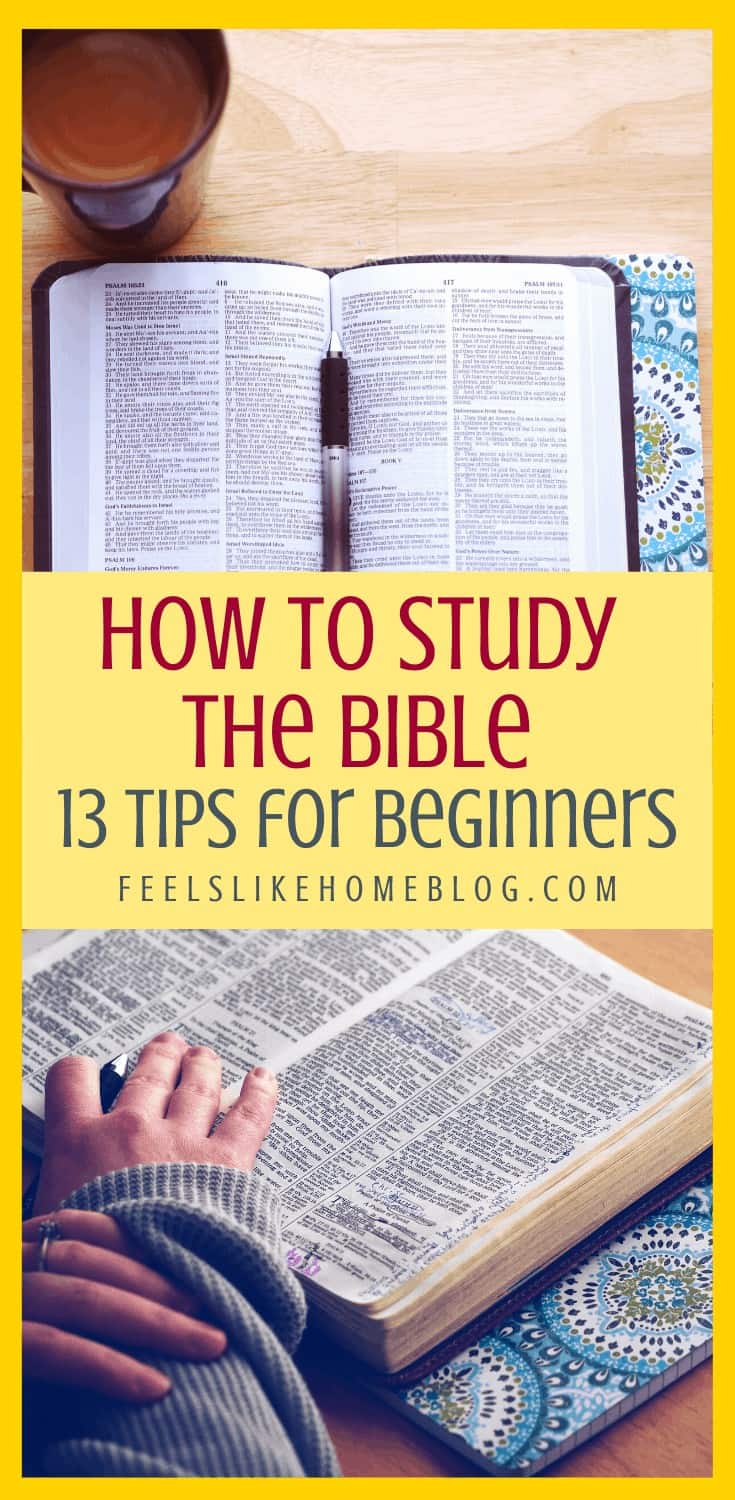
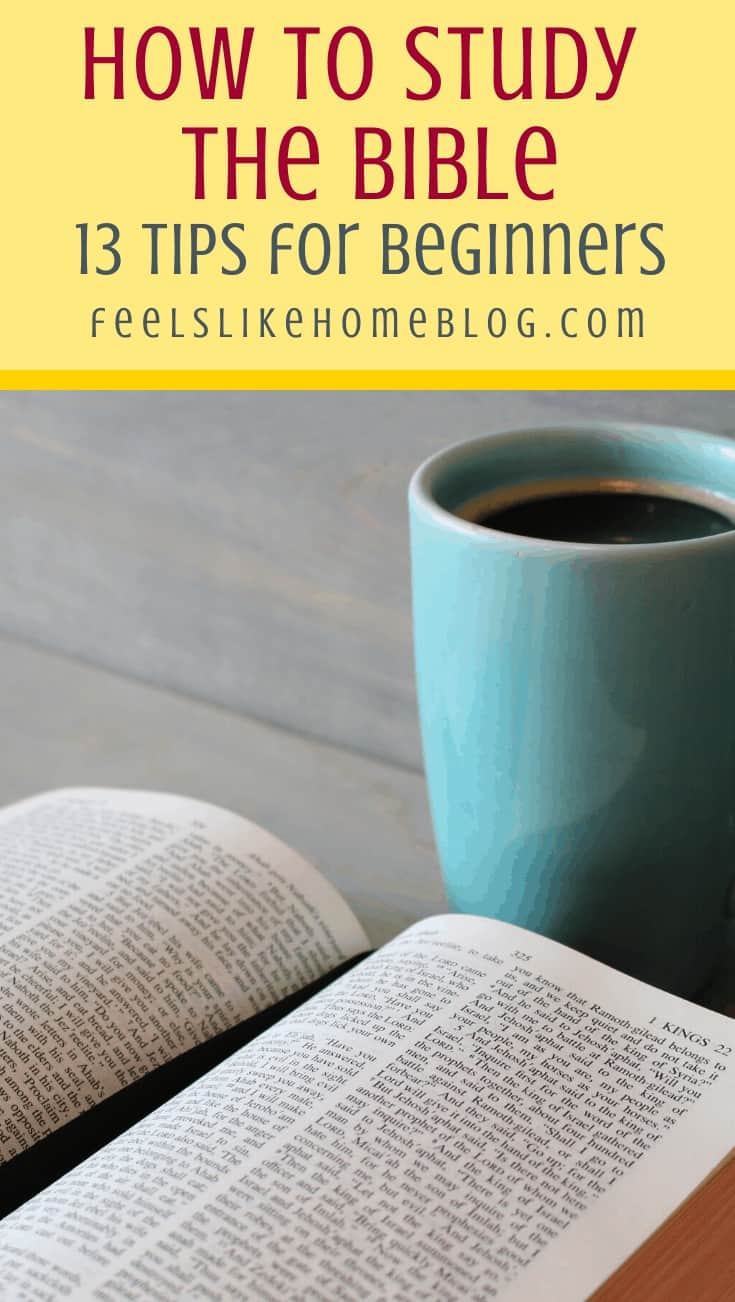

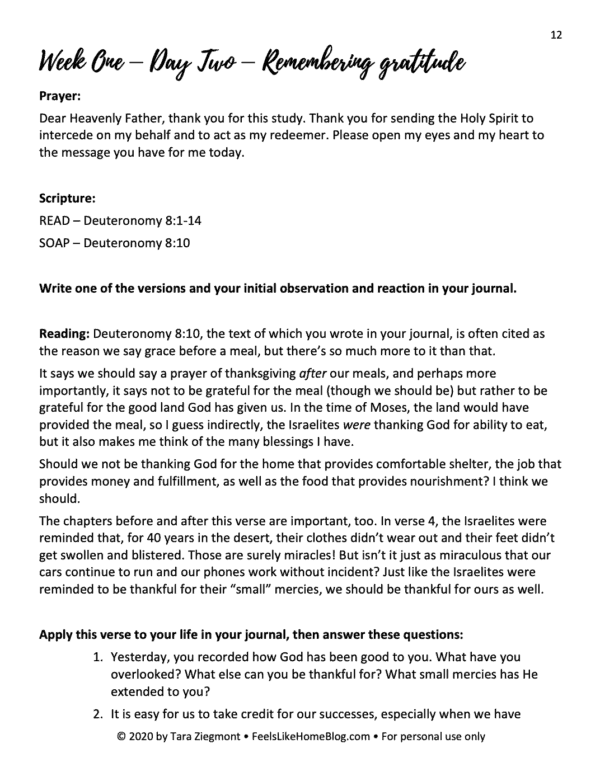

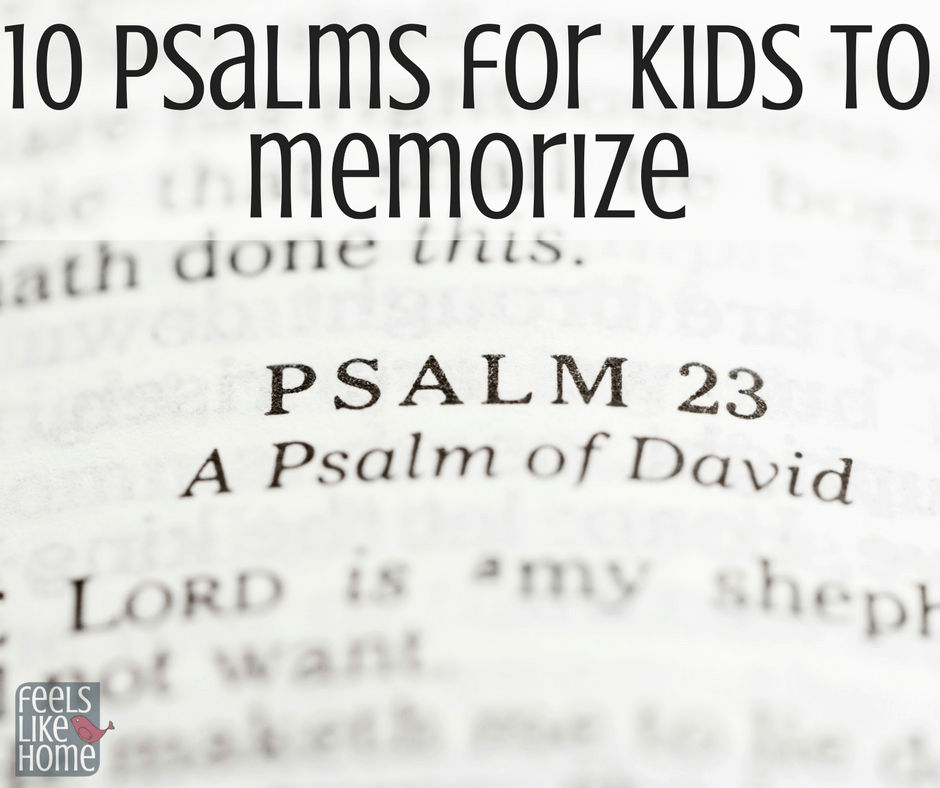
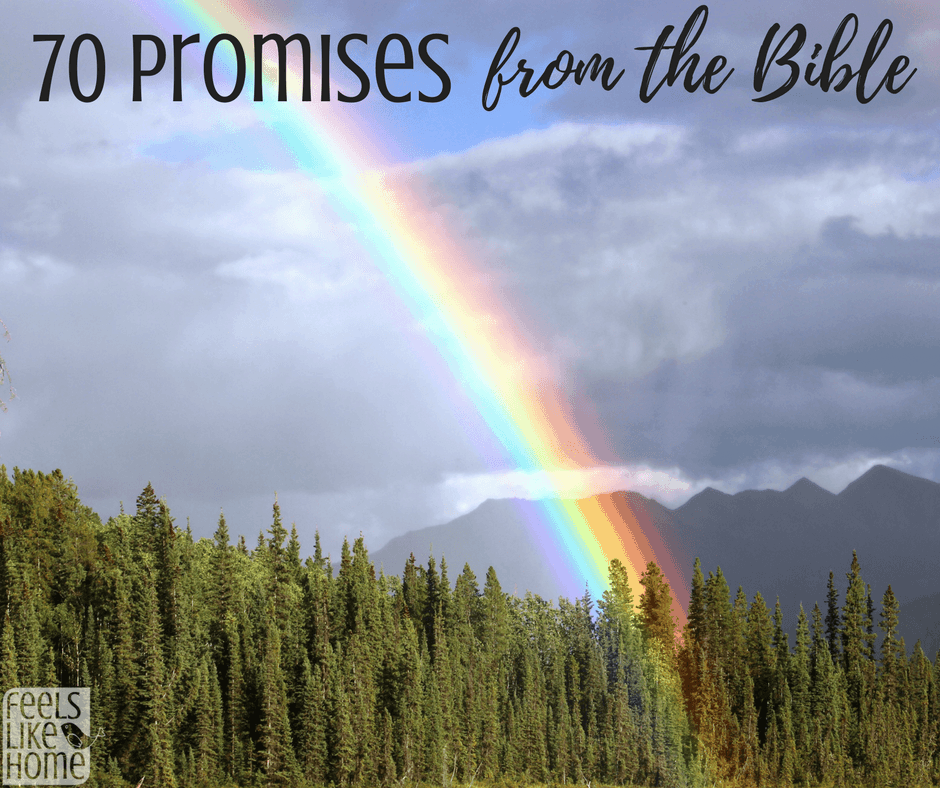
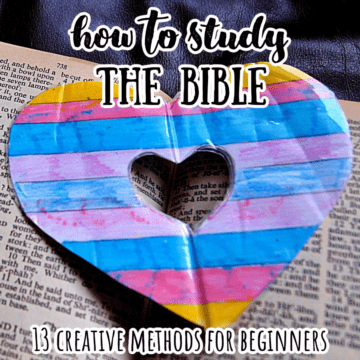
Amanda Allen says
❤❤❤❤❤
Joanne says
Found this by accident this morning. Thank you Tara for all these tips on Bible Study. Even though I have been a Christian for a long time I still find it hard to study Scripture and memorize verses. I've read quite alot on your blog. Congrats on your huge weight loss. Amazing! God bless you and your family
Tara Ziegmont says
Thank you Joanne!
Onyekweli Solomon says
This is amazing and spiritual
Oye says
Bless you. Very informative
Annah Sekgororwane says
Thank you Tara.I have been a Christian for a long time but struggling with reading and learning the word of God.I will now start to apply your tips on my journey of bible study.
Iam so humbled.
Once again thank you and GODBLESS
Emily Morris says
Hi! I am someone who has never really been into Christianity until I realized that I needed a change in my life, and I needed to find God to help guide me through it. I've recently been trying to get more involved in religion. All the different ways to study were quite overwhelming. This was very helpful and refreshing, and I'm very grateful. Good luck with your blog, and God bless you!
Vanita Warren says
Emily, I just happened to come across Tara's page (which btw is very good). I am a Believer in our Lord Jesus Christ and have been for over 40 years. I'm 63 (in Dec) and it's been an awesome journey with the Lord. He's been there with me every step of the way. Through all my mistakes and victories as well. I only have one suggestion for you. Please don't "get more involved in 'religion.'" That's not what being a disciple of Jesus is about. It is truly a 24-7 relationship with the God of Creation who cares for you (individually) so deeply. Ask Jesus to come into your heart and live inside of you, and He will. He will put in Spirit in you, and you will be at peace. He will never leave you or forsake you. Those words are so true, and you can trust Him. He will let you grow, and it may seem like He's not there (but that's just the "flesh"). When ever you feel that way, read Psalm 91. Make it your mantra. I promise you, that you will grow, and you will come to love Him more and more. You're not crazy when you're talking to Him--even though you can't see Him. Look at His Creation. It's all around you. He made it! It's evidence of Him. Trust Him first, in all things. I don't know Tara, but I think you found a good mentor in her. Stay the course! These days are revealing that! Stay the course! Love and blessings to you. Vanita Lynn Warren
Wendy says
This is fab! Thank you!
Christa Thomas says
Thank You So Much.
This is Really helpful.
chisengo says
this is very helpful and definitely trying out these methods
Helen Leung says
Thank you! I needed to recharged thru study and came across these words of yours. I Praise God for them. Gave me the lift I needed. I am 67 and you would think I would know what I am doing. But the older I get the more I do not know! Blessings to you! And again...thank you!
FRANCIS NNAEMEKA says
This is very refreshing and impactful. I had to take my time to write down all the steps in my book. Thankyou dear for dropping this piece. May God continue to guide and enlighten you the more. Amen.
Misty says
This is excellent! My youngest child started college and I'm kind of well, mostly out of a job that once took all my time and energy. So, I'm a bit at loose ends and I asked myself what I wanted to accomplish. One of the things I wanted to accomplish was to spend a year really getting to know God. I have the time. But I wasn't sure how to actually do it. Thanks for all the tips and suggestions. Everyone should be able to find a way that will click with them.
Natalie says
Thank you for your guidance. I was raised a Christian, but recently (I am 66 years old), I have been feeling I need to know more. I started with the Old Testament, but was lost and this past week started the New Testament Book of Mark. I loved reading it. I feel like I am getting on target.
Lashawndra Duncan says
This is an Amazing Article. I found this by accident. I found myself fall away from Learning the Bible. Being a natural Worshipper, Praise Dancer and a Youth leader doesn’t feel like it’s enough. Like I’m not giving him enough. Since my work schedule changed. I haven’t been able to commit to any of my spiritual duties. So I wanna find my way back to studying and gaining information to help me get over these tall walls. Everything around me is getting thick, and my devotion time in the car sometimes don’t seem like it’s doing enough either. I need to create a study habit to learn more of Gods Word. I need to sit still. I realize I’ll find myself studying criminal justice material for hours but struggle to give God 10mins. Studying God Words can be extremely deep but reading this article have help me to realize, I just need to add in a few more steps to overcome the anxiety. Thank you for this article
Edison Sembiring says
Thank you Tara. I have been read the Bible five times from Genesis to Revelation but don't feel like I understand it. I will try to apply the tips suggested on how to read the Bible.
Paula says
This was a good article and I enjoyed reading it. However, there was one thing I noticed that is incorrect; your statement that the NLT is a paraphrase is not correct. The ‘old’ LIVING BIBLE (done by Kenneth Taylor) was a paraphrase but the NLT (New Living Translation) is an actual translation, on the same thought-for-thought level that the NIV is, and was translated by a large contingent of Bible scholars. I personally do not like NIV much but I use the New American Standard Version of the Bible, a word-for-word translation on the same level as King James and New King James. Just a little info!
Onyekweli Solomon says
This is amazing and spiritual, thank you God bless you